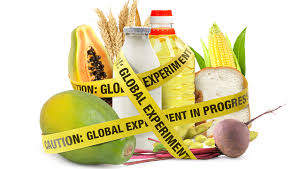ActionAid Nigeria has taken position on the controversy ranging over Nigeria adoption of Genetically Modified Foods, based on its concerns over fear that it can affect socio-economic, environmental and human rights of smallholder farmers and the danger of Intellectual Property Right (IPRs).
The Organisation in a paper titled: “ActionAid’s stand on GMOs in agriculture,” said it works for an agricultural system that promotes human rights, food security, economic and environmental sustainability through local control over natural resources, seeds, land, water, forests, knowledge and technology.
According to the NGO, they are crucial for smallholder farmers, landless people, pastoralists, livestock farmers, fishing folk and hunter-gatherer societies.
“Agriculture is the backbone of the economy and way of life in most developing countries. Access to the means of production and seed in particular is vital for largely agrarian economies. The majority of people in developing countries depend on agricultural production to sustain their livelihood and food security. Agriculture also has deep cultural, social and religious significance.
“We support alternatives driven by smallholder food producers’ movements to the industrial agricultural model, including resisting the use of genetic modification technology, on the grounds that it increases their dependency on external inputs, presents environmental risks, and reduces their autonomy over their livelihoods, food security, and nutritional choice.
“ActionAid therefore opposes Genetically Modified Organisms (GMOs) based on socioeconomic, environmental and human rights concerns. ActionAid does not take a position on the health impacts of GMOs because we do not have the necessary expertise to make informed decisions,” the statement reads
It however stated further it believes scientific and technological developments in agriculture are important for safe and healthy food production and environmental preservation but should not compromise communities’ control over resources, knowledge, decisions and technology. We therefore oppose GMOs based on socio-economic, environmental and human rights concerns,” it emphases.
It pointed out the danger of Intellectual property rights (IPRs) and corporate control, saying smallholders worldwide rely on farmer-saved seed and have little access to commercial seed systems, according to the FAO.
“In some countries well over 70% of seeds, even for major crops, are managed within the farmer-governed local seed system. Globally, it is estimated that 1.4 billion farmers rely on farm saved seeds, through a carefully considered selection process, farmers save a portion of their produce as seed for planting in the next season.
“They have exchanged seeds freely within communities over centuries, and have built credible knowledge on the crops as the basis for selective breeding to encourage positive traits.
“The varieties produced and conserved by subsistence farmers are designed to cope with local ecological conditions, pest problems and weather conditions to provide at least a minimum harvest even in the most difficult times.
“These varieties and the related knowledge have been jointly developed over centuries by the community as a whole, and are not subject to individual ownership.
“IPR protection of plants and seeds transfers the control over, and access to, the resources that secure the right to food from poor farmers and communities to private hands. But monopoly patents and the advance of other IPRs on GM crops, germplasm, plant and crop traits and DNA are making seed saving illegal, driving up costs of seeds, inhibiting public research and plant breeding, and threatening farmers’ rights to save, use, exchange and sell seed,” it said.
ActionAid opined that by focusing on the problems affecting food production, GMOs target the wrong aspect of the world’s food security challenges. It noted that while production challenges with pests or drought will always exist, food security is less a problem of the amount of food produced, and more a problem of access, distribution and storage of the food that is produced.
“If the same resources that are spent on the development of GMOs were instead devoted to improving distribution and storage systems for smallholder farmers, we would likely be much closer to a sustainable solution to global food insecurity.
“In agriculture, therefore this means going beyond systems and technologies that benefit the select 1% and those that are vulnerable to manipulation by corporate influence and requiring genuine participation of smallholder farmers and consumers in determining what technological means are adopted for agriculture, and how the use of that technology is governed.
“The use of patents and other IPRs to control access to food or the means to produce it is unacceptable. Not only can the patenting of food and farming crops lead directly and indirectly to a denial of the right to food, but in granting decades-long monopolies on ‘inventions’ relating to food and farming crops, particularly staples, we are sacrificing the free and public exchange of technologies that may benefit poor people.
“ActionAid shares concerns with many peasant movements and CSOs about the impact of GM crops on gene transfer contamination of local varieties, evolving resistance of pests and weeds, escalating use of inorganic fertilizers, herbicides and pesticides, habitat and biodiversity loss, and negative impacts on beneficial organisms, all of which would have impact of existing ecosystems integrity,” it said.




